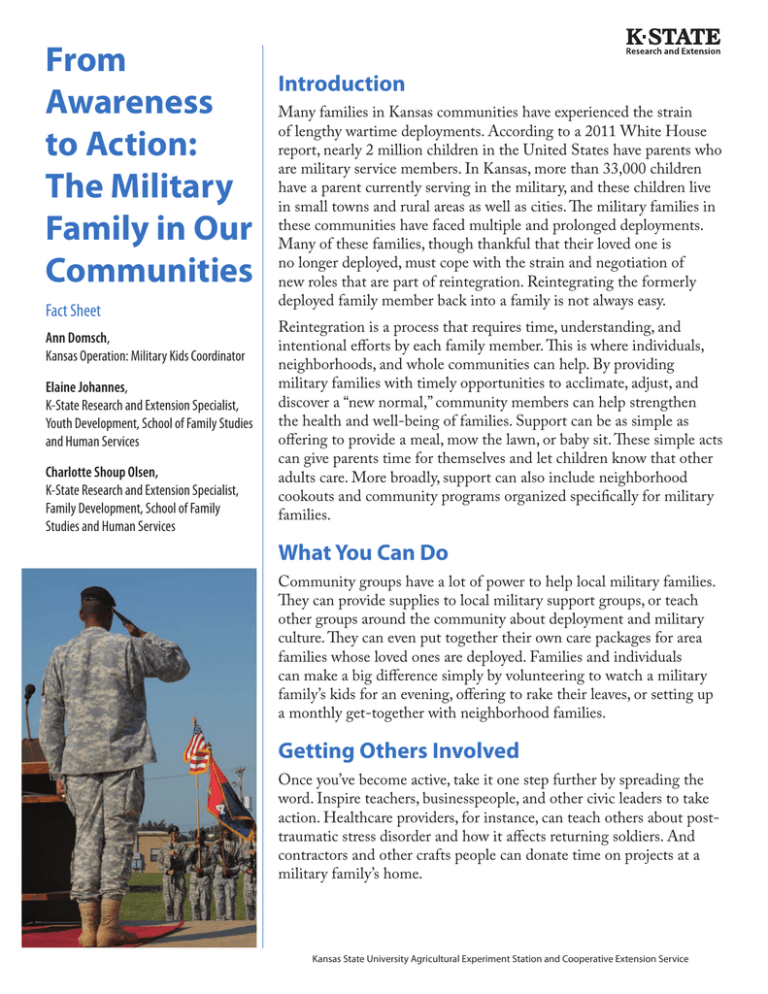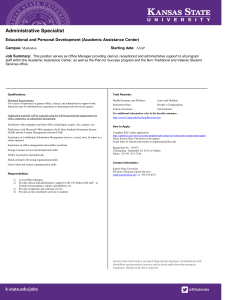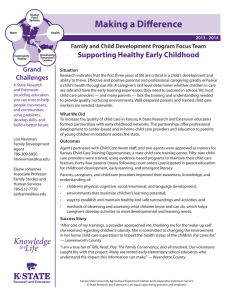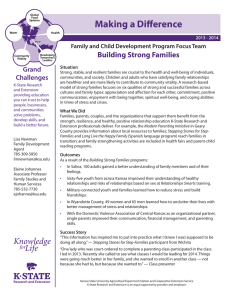
From
Awareness
to Action:
The Military
Family in Our
Communities
Fact Sheet
Ann Domsch,
Kansas Operation: Military Kids Coordinator
Elaine Johannes,
K-State Research and Extension Specialist,
Youth Development, School of Family Studies
and Human Services
Charlotte Shoup Olsen,
K-State Research and Extension Specialist,
Family Development, School of Family
Studies and Human Services
Introduction
Many families in Kansas communities have experienced the strain
of lengthy wartime deployments. According to a 2011 White House
report, nearly 2 million children in the United States have parents who
are military service members. In Kansas, more than 33,000 children
have a parent currently serving in the military, and these children live
in small towns and rural areas as well as cities. The military families in
these communities have faced multiple and prolonged deployments.
Many of these families, though thankful that their loved one is
no longer deployed, must cope with the strain and negotiation of
new roles that are part of reintegration. Reintegrating the formerly
deployed family member back into a family is not always easy.
Reintegration is a process that requires time, understanding, and
intentional efforts by each family member. This is where individuals,
neighborhoods, and whole communities can help. By providing
military families with timely opportunities to acclimate, adjust, and
discover a “new normal,” community members can help strengthen
the health and well-being of families. Support can be as simple as
offering to provide a meal, mow the lawn, or baby sit. These simple acts
can give parents time for themselves and let children know that other
adults care. More broadly, support can also include neighborhood
cookouts and community programs organized specifically for military
families.
What You Can Do
Community groups have a lot of power to help local military families.
They can provide supplies to local military support groups, or teach
other groups around the community about deployment and military
culture. They can even put together their own care packages for area
families whose loved ones are deployed. Families and individuals
can make a big difference simply by volunteering to watch a military
family’s kids for an evening, offering to rake their leaves, or setting up
a monthly get-together with neighborhood families.
Getting Others Involved
Once you’ve become active, take it one step further by spreading the
word. Inspire teachers, businesspeople, and other civic leaders to take
action. Healthcare providers, for instance, can teach others about posttraumatic stress disorder and how it affects returning soldiers. And
contractors and other crafts people can donate time on projects at a
military family’s home.
Kansas State University Agricultural Experiment Station and Cooperative Extension Service
Community Action
It seems the hardest part about providing support to military
families is figuring out what to do. But in reality, military families
are very much like other Kansas families. So consider what you
might appreciate if a member of your family were deployed. There
are dozens of things, both big and small, that you can do to help. Try
brainstorming your own options to add to the list.
Community Groups
• Sponsor parades or special events.
• Compile and distribute a list of community resources.
• Provide Operation: Military Kids (OMK) with materials for Hero
Packs (backpacks full of activities and ways to stay connected to
deployed parents).
• Sponsor military support networks in businesses and
neighborhoods.
• Provide the local Army Family Readiness Group with requested
items.
• Organize an around-the-house help day.
• Hold child care training for military kids.
• Provide transportation to practices and appointments.
• Create scholarships for youth to join teams and attend special
events.
• Invite soldiers and their families to speak at club meetings.
• Coordinate a community resource festival for military families.
• Connect military families with helpful organizations.
• Sponsor a mother’s/father’s day out.
2
Schools
• Educate staff about challenges military kids face.
• Allow time for communication with deployed loved ones.
• Sponsor military appreciation events at school functions.
• Display OMK banners in schools.
• Educate staff about post-traumatic stress disorder (PTSD).
City and County Officials
• Recognize the contributions of military families.
• Provide waivers or passes for local recreational facilities.
• Include military families on committees and boards.
• Designate a committee or commissioner as the community’s
military champion.
• Include military family support messages on government websites.
• Display OMK banners in government offices.
• Distribute OMK seals and stickers as bill inserts.
• Adopt a local military branch.
Everyone
• Volunteer to babysit.
• Offer to help with household chores.
• Educate others about how deployment affects families.
• Tutor military kids.
• Invite military kids to join recreational teams and groups.
• Volunteer to do a family’s shopping.
• Drop off a home-cooked meal.
Families Helping Families
• Encourage families to enjoy each other’s company.
• Support lots of quality time.
• Share fun times.
• Appreciate the fact that good things take time.
• When families are ready to accept help, offer something specific
and useful. Few people request help when they’re told, “Just let me
know if you need help.”
• Remember, do not push too hard to help families that do not want
help at the moment. Show that you care, but do not overwhelm.
Adapted from: Qualities of Strong Families, by Charlotte Shoup Olsen.
Available at: www.ksre.ksu.edu/Families/~/doc8735.ashx
3
Contact
Ann Domsch
Coordinator
Kansas Operation: Military Kids
785-532-2276
adomsch@ksu.edu
www.operationmilitarykids.org
Resources for Helping
• Operation: Military Kids — www.operationmilitarykids.org
• Military OneSource — www.militaryonesource.com
• Military Child Education Coalition — www.militarychild.org
• Military HOMEFRONT — www.militaryhomefront.dod.mil
Elaine Johannes, Ph.D.
Associate Professor and Extension Specialist
– Youth Development
School of Family Studies and Human Services
785-532-7720
ejohanne@ksu.edu
Charlotte Shoup Olsen, Ph.D.
Professor and Extension Specialist – Family
Development
School of Family Studies and Human Services
785-532-5773
colsen@ksu.edu
Brand names appearing in this publication are for product identification purposes only.
No endorsement is intended, nor is criticism implied of similar products not mentioned.
Publications from Kansas State University are available at: www.ksre.ksu.edu
Publications are reviewed or revised annually by appropriate faculty to reflect current research and practice. Date shown is that of
publication or last revision. Contents of this publication may be freely reproduced for educational purposes. All other rights reserved.
In each case, credit Ann Domsch, Elaine Johannes, Ph.D., and Charlotte Shoup Olsen, Ph.D.,
Awareness to Action: The Military Family in our Communities, Fact Sheet, Kansas State University, August 2012.
Kansas State University Agricultural Experiment Station and Cooperative Extension Service
MF3062
August 2012
K-State Research and Extension is an equal opportunity provider and employer. Issued in furtherance of Cooperative Extension Work, Acts of May 8 and June 30, 1914,
as amended. Kansas State University, County Extension Councils, Extension Districts, and United States Department of Agriculture Cooperating, John D. Floros, Director.




